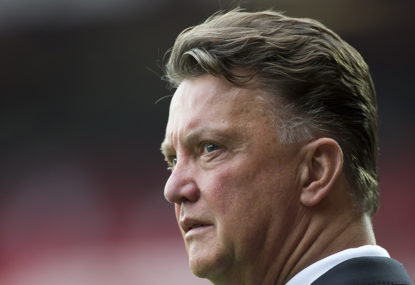In Michael Calvin’s brilliant book Life on the Volcano, Stoke City manager Mark Hughes recalls his final days as Manchester City boss.
It was more than a year on from the beginning of the Sheikh Mansour and City Football Group era. The chairman, Khaldoon Al Mubarak, flew to Manchester for City’s FA Cup fifth round meeting with Arsenal, apparently with the expectation that his side would get beaten and he could formally show Hughes the door.
City won 3-0. Khaldoon flew back out of the country, Hughes kept his job.
More football:
» FFA must dock the Wanderers competition points
» FFA talking tough could be rough for Wanderers
» Fan issues escalate: FFA charge Wanderers with bringing game into disrepute
» It’s time for A-League supporters to unite against flares
» A-League fans have shot themselves in the foot
The Emirati did the same three days later as City hosted Chelsea in the league. Hughes was safe for another week after a 2-1 win, Khaldoon again flew back out of the country.
The third time proved unlucky for the former Wales international, who was eventually sacked when Khaldoon flew back into England on December 19, 2009 for a 4-3 win against Sunderland.
Hughes’ time at City certainly won’t be fondly remembered, though in fairness, it was a volatile time as the club made flash signings and immediate success their priority.
But the fact his obituary was twice written, only to be rescued by a victory, speaks of the impulsive nature of 21st-century football.
It must be one of the most fickle jobs on the market. This season in particular, we’ve witnessed a dearth of job security for football managers.
You can be sacked for poor results, you can be sacked for decent results but poor performances, you can be sacked for not having the faith of the dressing room, you can be sacked for disputing with the club’s owners, you can be sacked for earning the ire of your fans.
As Hughes described it: “It’s ridiculous. The only way you can keep things level and stable is by winning football matches and there’s only really the top five or six clubs that can consistently win week in, week out.”
When Derby sacked Paul Clement on Monday, he became the 40th manager in England’s top four tiers this season to lose his job. 38 of the 92 teams have changed face on the touchline since August, the doors at Charlton and Oldham Athletic each revolving twice.
Derby sit fifth in the Championship, having slipped in recent weeks after being top of the league on Boxing Day.
Clement entered his first managerial role in June last year with significant pedigree, having been assistant to Carlo Ancelotti at PSG, Real Madrid and Chelsea.
He signed a three-year deal with the east Midlands club, but lasted less than a quarter of that time. According to the club, this wasn’t a decision driven by results, but rather a failure to make enough progress in his short time in charge.
The club’s chairman, Mel Morris, insists promotion was ‘not the primary target’, but if that’s the case, could Clement not have been afforded more time to mould the squad into his image?
The 43-year-old recruited Tom Ince and Bradley Johnson last summer and recruited striker Nick Blackman – who was prolific at Reading in the first half of the season – in the January window.
For many under pressure managers, like Louis van Gaal, results are often the saving grace, though Clement’s sacking attests to the incredible demands of life as a modern day manager.
Van Gaal is in the process of being mauled by the British press. If he makes it to the end of the season, he may just be the most resilient man in the game.
At every press conference, he’s baited as those in the press salivate over a wise crack at them or a ‘comical’ outburst.
It comes now and then, though the Dutchman has remained incredibly composed when you consider some of the questions thrown his way.
Again on Sunday he was asked if it was important for his team to perform while United tries to replace him. This isn’t scrutiny, as is part and parcel of the game, this is a witch hunt.
Few can disagree that Manchester United have been dour at times this season, and Van Gaal appears to be on his last legs, but he’s been battered in what has become the most daunting job in football.
The mental toll of being a manager is often underrated. The most confronting interview in Calvin’s book is with Martin Ling – a man whose battle with mental illness has been well publicised.
As boss at Cambridge United, Ling felt the weight of depression. He recalled: “I couldn’t cope with leaving people out of the team. I knew I was upsetting them, spoiling their lives. I have done it throughout my career, and suddenly an everyday decision puts my life on the line.”
Ling joined League One side Swindon in November last year, but resigned on December 29 for health reasons.
According to the BBC, the average life expectancy of a Championship manager last season was 319 days.
The weight of expectation in football gnaws at those on the sideline. They’re the scapegoats when things go wrong, only lauded when things go immensely well.
We’ll go on criticising a manager whose team isn’t performing, but it’s worth at least trying on their very big shoes.





























































































